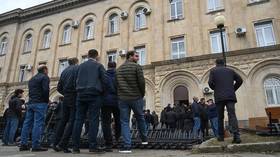Haiti needs a relief effort that doesn't continue oppression
Carl Dix of the Revolutionary Communist Party says that US-Haitian relations has influenced the way the relief efforts have unfolded in Haiti. Is there any solution except a revolution?
The earthquake in Haiti raised all sorts of questions about Haiti's leadership and the country's ongoing poverty, even in the best of times. Haiti has had a difficult history, from its independence in a slave revolt through the rule of "Papa Doc" Duvalier and his son "Baby Doc."
Carl Dix, the national spokesman for the Revolutionary Communist Party, puts part of the blame for Haiti's sorry state on the United States and France, which, he believes, are committed to keeping Haiti impoverished.
Dix argues that the US has brought in mainly paratroopers to control the situation in Haiti and has failed to focus on what people really needs. He believes that this is indicative of US priorities towards Haiti. Like Haiti, the city of Los Angeles was built on a fault line, but Dix says the US government would treat a disaster in there much differently.
"You need rescue and supply efforts that do not oppress the Haitian people, but releases them and helps them," said Dix.
Were the US to actually be interested in helping Haiti, Dix explained, relief supplies could be brought in from Cuba or military infrastructure could be used more efficiently, but as the relief effort continues, it seems to be more of the same disorganization.













